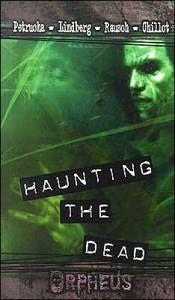 This macabre quartet of short stories is based on White Wolf’s Orpheus line of games. Like the name suggests, the stories all touch upon the delicate, occasionally breached barriers between life and death, and the traumas that ensue. The dead have their secrets, and don’t take too well to the living trying to mine those secrets for their own ends. In some regards, it resembles the movie Flatliners, but trust me, it has its own unique twists. From the very beginning of Stefan Petrucha’s “The Grass Is Always Greener,” to the end of Rich Chillot’s “Corridors,” these are not stories for the weak of stomach or the faint of heart. These are the disturbing scrapings of nightmares and horror archetypes. Occasionally graphic (I’ve never seen an entire paragraph devoted to describing a pizza in such unappetizing, horrific terms) and sometimes brutal, Haunting the Dead is not a casual read. It is, however, something that might just appeal to the hardcore horror readers, those who like it visceral and direct. As far as I could tell, no knowledge of the Orpheus game line is needed to get into the mood of the stories. Rather, one can just jump right in to these tales of the restless – and sometimes very upset – dead and the people who dare to disturb them. Don’t read this one late at night.
This macabre quartet of short stories is based on White Wolf’s Orpheus line of games. Like the name suggests, the stories all touch upon the delicate, occasionally breached barriers between life and death, and the traumas that ensue. The dead have their secrets, and don’t take too well to the living trying to mine those secrets for their own ends. In some regards, it resembles the movie Flatliners, but trust me, it has its own unique twists. From the very beginning of Stefan Petrucha’s “The Grass Is Always Greener,” to the end of Rich Chillot’s “Corridors,” these are not stories for the weak of stomach or the faint of heart. These are the disturbing scrapings of nightmares and horror archetypes. Occasionally graphic (I’ve never seen an entire paragraph devoted to describing a pizza in such unappetizing, horrific terms) and sometimes brutal, Haunting the Dead is not a casual read. It is, however, something that might just appeal to the hardcore horror readers, those who like it visceral and direct. As far as I could tell, no knowledge of the Orpheus game line is needed to get into the mood of the stories. Rather, one can just jump right in to these tales of the restless – and sometimes very upset – dead and the people who dare to disturb them. Don’t read this one late at night.
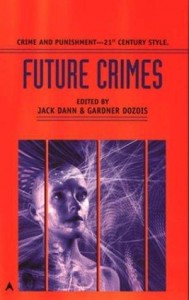 In contrast to the original anthologies I’ve been looking at, Future Crimes is a collection of reprints, bringing together eight stories of, well, crime in the future. I’m sure some of the selections will be familiar to any fan of the genre. By far the most famous of these is Harlan Ellison’s classic “‘Repent, Harlequin!’ Said the Ticktockman” which is one of those stories that almost defies description, about a world where lateness is a crime carrying a death sentence and one man dares to defy the entire clockwork system. Another classic is C.M. Kornbluth’s “Time Bum,” where an ingenious scam carries an unexpected twist. It’s a short and subtle piece with an old-fashioned flavor to it, but still quite entertaining. Also included is Kristine Kathryn Rusch’s “The Retrieval Artist,” about a detective who specializes in finding what doesn’t want to be found, a story which has since become the basis for an entire series of books. With other stories by Michael Swanwick, Algis Budrys, Brian Stableford, Tony Daniel, and Kim Stanley Robinson, Future Crimes is a nice, solid collection of quality reprints, worth checking out. Once again, Dann and Dozois have a knack for putting together these theme reprints.
In contrast to the original anthologies I’ve been looking at, Future Crimes is a collection of reprints, bringing together eight stories of, well, crime in the future. I’m sure some of the selections will be familiar to any fan of the genre. By far the most famous of these is Harlan Ellison’s classic “‘Repent, Harlequin!’ Said the Ticktockman” which is one of those stories that almost defies description, about a world where lateness is a crime carrying a death sentence and one man dares to defy the entire clockwork system. Another classic is C.M. Kornbluth’s “Time Bum,” where an ingenious scam carries an unexpected twist. It’s a short and subtle piece with an old-fashioned flavor to it, but still quite entertaining. Also included is Kristine Kathryn Rusch’s “The Retrieval Artist,” about a detective who specializes in finding what doesn’t want to be found, a story which has since become the basis for an entire series of books. With other stories by Michael Swanwick, Algis Budrys, Brian Stableford, Tony Daniel, and Kim Stanley Robinson, Future Crimes is a nice, solid collection of quality reprints, worth checking out. Once again, Dann and Dozois have a knack for putting together these theme reprints.
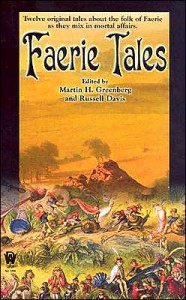 There are days when I’m frankly amazed at the continuing ability of writers to wring new and interesting material from the oft-mined theme of “fairy tales.” After all, we’ve been telling and retelling them for centuries, updating the settings to fit the era, and still, there’s no end in sight to possible permutations. Take this new anthology, for instance. The theme is simple; the ways in which the authors fulfill their mandate are quite varied. Some of the authors stick fairly close to the source material, while others offer up twists that are almost too bizarre to believe. But they’re still fairy tales at heart. Tales of the unearthly, immortal, capricious magical beings that have haunted our dreams and inspired our stories for as long as we can remember.
There are days when I’m frankly amazed at the continuing ability of writers to wring new and interesting material from the oft-mined theme of “fairy tales.” After all, we’ve been telling and retelling them for centuries, updating the settings to fit the era, and still, there’s no end in sight to possible permutations. Take this new anthology, for instance. The theme is simple; the ways in which the authors fulfill their mandate are quite varied. Some of the authors stick fairly close to the source material, while others offer up twists that are almost too bizarre to believe. But they’re still fairy tales at heart. Tales of the unearthly, immortal, capricious magical beings that have haunted our dreams and inspired our stories for as long as we can remember.
Unsurprisingly, Charles de Lint, best known for his continuing sequence of urban fairy tales set in the fictional North American city of Newford, is present. “Sweet Forget-Me-Not” touches upon one of his earlier stories, revisiting the odd phenomenon known as the gemmin, fey creatures that stick around long enough to experience the stories and memories of a place before moving on. A young man, alienated by his peers for his ethnic origins, finds love and acceptance with the gemmin, only to have to make a hard choice in the end. I’m never disappointed with de Lint’s stories; even when it looks like he’s repeating himself, he’s still full of surprises.
Kristine Kathryn Rusch gives us “Judgement,” a poignant piece set in the days after World War II, during the Nuremberg Trials. An immortal cut off from his home finally sees a chance to return, but what he’s learned of the mortal world may have changed him forever … and change is the one thing his people cannot abide.
In Sarah Hoyt’s “Yellow Tide Foam,” a new drug is sweeping the streets. Tantalizing and dangerous, it quite literally takes its users out of their world, but what’s in it for the fairies who deal it? Tanya Huff produces a new take on the old “Tam Lin” story (one of my favorites) in “He Said, Sidhe Said.” A Faerie queen takes a mortal lover, but the heroes of the modern world have changed since the last time such a thing was done. Is Faerie ready for skateboards?
James Fiscus is one of those who’s taken the original material and gone somewhere utterly new with it. In “A Very Special Relativity,” fairies and space travel combine for an unusual tale of debt and repayment. Adam Stemple, on the other hand, sticks to the basics with a slightly updated version of a changeling story in “A Piece of Flesh,” in which a teenage girl discovers an unsettling truth about her new baby brother. Jane Lindskold returns to the world of the athanor, immortal beings that have inspired myth and legends throughout human history, in “Witches’-broom, Apple Soon.” The intelligent coyote pup Shahrazad is back, and it’s up to her to protect the secrets of her home from an overly-intrusive human. Fans of Changer and Legends Walking will be pleased at even this brief return to the fascinating setting.
Stories by Elizabeth Ann Scarborough, Michelle West, Wen Spencer, Tim Waggoner, and John Helfers round out the even dozen stories in this book. Overall, I was impressed at the range and quality to be found here; obviously, the well is nowhere near dry as far as fairy tales go.
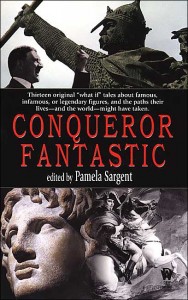 I so wish I’d come up with the “Fantastic” line of anthologies. It’s like a franchise in some ways, especially considering the vast array of collections we’ve seen over the years. Conqueror Fantastic actually hearkens back to the ones Mike Resnick edited, being an anthology of alternate history stories with a common theme. In this instance, Pamela Sargent asked a group of authors to find pivotal points in history starring “conquerors” (for all that term implies), and to imagine a different path. The results are certainly interesting.
I so wish I’d come up with the “Fantastic” line of anthologies. It’s like a franchise in some ways, especially considering the vast array of collections we’ve seen over the years. Conqueror Fantastic actually hearkens back to the ones Mike Resnick edited, being an anthology of alternate history stories with a common theme. In this instance, Pamela Sargent asked a group of authors to find pivotal points in history starring “conquerors” (for all that term implies), and to imagine a different path. The results are certainly interesting.
There’s the strange, such as Paul Di Filippo’s “Observable Things,” which invokes the spirits of Robert Howard and H.P. Lovecraft to reimagine an episode early in New England’s history. This one is surely an acquired taste, for I found it extremely hard to get into. Much more to my personal tastes was “Intensified Transmogrification” by Barry Malzberg and Bill Pronzini, dealing with a Lyndon B. Johnson driven to madness by his obsession with the Vietnam War and the Communist Chinese Menace.
Other conquerors who get their turn in the spotlight include Napoleon (George Zebroski’s “Nappy”), Hitler (Ian Watson’s “Adolf” and Stephen Dedman’s “Twilight of Idols”), Genghis Khan (Pamela Sargent’s “Spirit Brother” and James Morrow’s “Martyrs of the Upshot Knothole”), Alexander the Great (Michelle West’s “To The Gods Their Due”), and more. Everyone has their own favorite periods of history, and those periods of history which leave them cold. Likewise, this is a scattershot collection, the stories all quite well done, but catering to a range of tastes. I plan to go back and reread some of the stories I merely skimmed, but even with a first impression, I like what I see here. Conqueror Fantastic does a good job of living up to its mandate.
Everything I’ve done for Realms of Fantasy, which the exception of the most recent issue, has been uploaded. Go back and thrill to over 150 reviews covering SF and fantasy YA from 2006-2009. Look up your favorites, including Percy Jackson, Harry Potter, Beka Cooper, Alfred Kropp, Maggie Quinn and many more.
All of my short fiction reviews for the “Short Cuts” column I wrote for Science Fiction Chronicle are now added to the database. However, I only uploaded the anthology reviews; for my own sanity, I skipped the magazine reviews. If anyone actually wants my sad attempts to cover magazines from 2003-2005, I’ll reconsider, but I’m not holding my breath. Formatting may still be a little wonky on some of these, as I really had to do some digging on old computers and in email to track down some of the columns. Enjoy them anyway.
Still to come: The Green Man Review 1999-2009, Absolute Magnitude, Science Fiction Chronicle YA reviews.
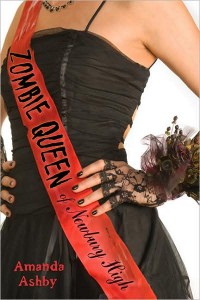 Mia never should have tried to cast that love spell. But she couldn’t let her nemesis, Samantha, steal her prom date. All’s fair in love and war, right? Except one botched spell later, the entire school loves Mia … loves her to death, in fact, since she’s turned the school body into zombies, with herself as their accidental queen. Now she has just a few days to reverse the spell before she becomes the first prom queen to act as a zombie buffet. Luckily, she has professional zombie hunter Chase, and her hypochondriac best friend Candice, to back her up. Can they set things right before this year’s prom theme becomes “Braaaains?” You’ll never look at high school zombies the same way again. Clever and fast-paced, this is an amusing twist on the subject matter, and an all-around enjoyable read.
Mia never should have tried to cast that love spell. But she couldn’t let her nemesis, Samantha, steal her prom date. All’s fair in love and war, right? Except one botched spell later, the entire school loves Mia … loves her to death, in fact, since she’s turned the school body into zombies, with herself as their accidental queen. Now she has just a few days to reverse the spell before she becomes the first prom queen to act as a zombie buffet. Luckily, she has professional zombie hunter Chase, and her hypochondriac best friend Candice, to back her up. Can they set things right before this year’s prom theme becomes “Braaaains?” You’ll never look at high school zombies the same way again. Clever and fast-paced, this is an amusing twist on the subject matter, and an all-around enjoyable read.
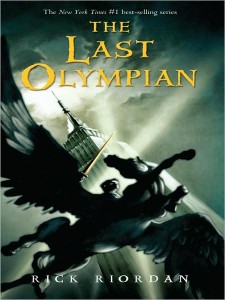 Percy Jackson, demi-god son of Poseidon, meets his destiny in the epic conclusion to this series. As the ancient monster Typhon marches across America with only the gods of Olympus to slow him down, the infamous Titan Kronos launches an all-out assault upon New York City, and it’s up to Percy and his allies to stand their ground and save the day. But a prophecy is about to come true at a great cost. Heroes and monsters alike will die in the streets of Manhattan; not even the gods know how things will turn out. A nonstop adventure that takes our heroes across America, through time and space, and even into the underworld, The Last Olympian is a superb reworking of the Greek myths. With its memorable characters, widescreen action, and no-holds-barred plot, this is a worthy end to the series, sure to satisfy fans.
Percy Jackson, demi-god son of Poseidon, meets his destiny in the epic conclusion to this series. As the ancient monster Typhon marches across America with only the gods of Olympus to slow him down, the infamous Titan Kronos launches an all-out assault upon New York City, and it’s up to Percy and his allies to stand their ground and save the day. But a prophecy is about to come true at a great cost. Heroes and monsters alike will die in the streets of Manhattan; not even the gods know how things will turn out. A nonstop adventure that takes our heroes across America, through time and space, and even into the underworld, The Last Olympian is a superb reworking of the Greek myths. With its memorable characters, widescreen action, and no-holds-barred plot, this is a worthy end to the series, sure to satisfy fans.
 Following the death of her parents, Lucinda went to live with her aunt and uncle, working in their jewelry shop for little thanks and no pay, at the mercy of her aunt’s cruel moods. That changes when the mysterious Amaranth Witch enters her life, with a dangerous proposition. As a result, Lucinda is caught up in a tangled web of intrigue, adventure, magic and deceit. Befriended by a witch, bedeviled by a teenage pickpocket, disavowed by her aunt, on the run from the law and romanced by a prince, Lucinda may just discover her true place in life. That is, if the man who killed her parents doesn’t come for her first. A complex, intriguing story with some decidedly unexpected twists and turns, it plays against expectations, defies convention, and delivers a satisfying ending.
Following the death of her parents, Lucinda went to live with her aunt and uncle, working in their jewelry shop for little thanks and no pay, at the mercy of her aunt’s cruel moods. That changes when the mysterious Amaranth Witch enters her life, with a dangerous proposition. As a result, Lucinda is caught up in a tangled web of intrigue, adventure, magic and deceit. Befriended by a witch, bedeviled by a teenage pickpocket, disavowed by her aunt, on the run from the law and romanced by a prince, Lucinda may just discover her true place in life. That is, if the man who killed her parents doesn’t come for her first. A complex, intriguing story with some decidedly unexpected twists and turns, it plays against expectations, defies convention, and delivers a satisfying ending.
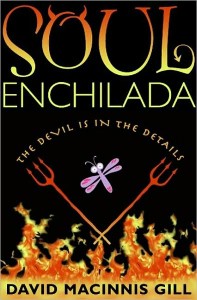 The only thing Eunice “Bug” Smoot has of value is her car, a 1958 Cadillac Biarritz that belonged to her grandfather. No wonder she’s surprised when the enigmatic Mr. Beals turns up in the backseat and tells her that both it and her soul are about to be repossessed, because her grandfather defaulted on a contract. Now she has two days to outwit the devil and free herself from an infernal entanglement. Even with the help of Pesto, a cute guy who definitely knows more than he lets on, can Bug pull off the impossible? Well, she never backed down on a challenge before… Soul Enchilada is a spicy Southwestern story of cars, souls, fiendish plans, deadly challenges and affairs of the heart, as told through Bug’s unique blend of stubborn sass and fierce independence. With a memorable voice and a fast-paced plot, unafraid to tackle issues of race and class, this marks a rather strong debut for the author.
The only thing Eunice “Bug” Smoot has of value is her car, a 1958 Cadillac Biarritz that belonged to her grandfather. No wonder she’s surprised when the enigmatic Mr. Beals turns up in the backseat and tells her that both it and her soul are about to be repossessed, because her grandfather defaulted on a contract. Now she has two days to outwit the devil and free herself from an infernal entanglement. Even with the help of Pesto, a cute guy who definitely knows more than he lets on, can Bug pull off the impossible? Well, she never backed down on a challenge before… Soul Enchilada is a spicy Southwestern story of cars, souls, fiendish plans, deadly challenges and affairs of the heart, as told through Bug’s unique blend of stubborn sass and fierce independence. With a memorable voice and a fast-paced plot, unafraid to tackle issues of race and class, this marks a rather strong debut for the author.
 When spoiled teen princess Alison Cole falls for the bad advice of some treacherous friends and undergoes an experimental plastic surgery procedure, it backfires, secretly granting her pyrokinetic abilities. Meanwhile, her popularity mysteriously vanishes overnight, her friends desert her, and even her boyfriend abandons her. With no one but the geeky David Eels left for moral support, what’s the flame-wielding girl to do but put on a costume and fight crime as the dubiously-named Hottie? Now she’s L.A.’s newest darling, foiling bank robbers and even acquiring her own arch nemesis in the process. Amusing and tongue-in-cheek, Hottie is what happens when Gossip Girl meets comic books. While it has a certain charm, it’s occasionally hard to take seriously, and the ending could be stronger.
When spoiled teen princess Alison Cole falls for the bad advice of some treacherous friends and undergoes an experimental plastic surgery procedure, it backfires, secretly granting her pyrokinetic abilities. Meanwhile, her popularity mysteriously vanishes overnight, her friends desert her, and even her boyfriend abandons her. With no one but the geeky David Eels left for moral support, what’s the flame-wielding girl to do but put on a costume and fight crime as the dubiously-named Hottie? Now she’s L.A.’s newest darling, foiling bank robbers and even acquiring her own arch nemesis in the process. Amusing and tongue-in-cheek, Hottie is what happens when Gossip Girl meets comic books. While it has a certain charm, it’s occasionally hard to take seriously, and the ending could be stronger.
